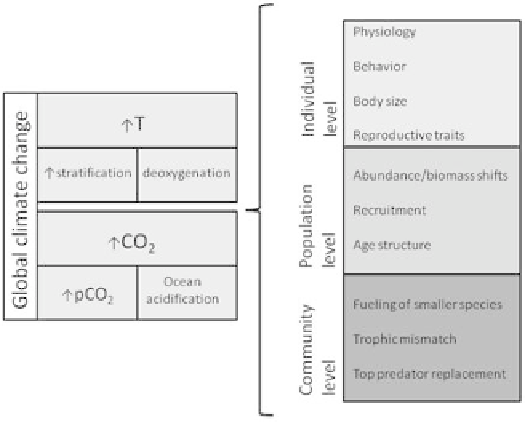Environmental Engineering Reference
In-Depth Information
high sensitivity of pelagic communities to climate-driven changes will lead
to variable responses at all levels of organization (Fig. 2), in which direction
and magnitude, would be diffi cult to predict, thus the implementation of
proper management and mitigation policies are urgently needed.
Fig. 2.
Abiotic consequences of global climate change (left boxes) and the associated impact
on the different levels of ecological organization of fi shes (right boxes).
How Fisheries Increment the Effects of Climate Change on
Marine Ecosystems
It is expected that fi shes and ecosystems in general will be adapted to the
changes in climate variability as they did in the past. However, there are
new factors like overfi shing that will alter this natural ability, especially if
the rate of climate change grows rapidly (Perry et al. 2010b). Overfi shing has
become an ocean-wide problem, since it simplifi es the general characteristics
of marine populations making them more sensitive to climate change (FAO
2004, Perry et al. 2010b). Some of the fi sh species that are the main target of
fi sheries are in serious danger of being extinguished (Sadovy and Cheung
2003). Meanwhile a loss of marine biodiversity is expected as a consequence
of the poor specifi city of fi shing gear that leads to the incidental capture of
non-target species (Allan 2005, Worm et al. 2006, Daw et al. 2009).
The main issue concerning the mortality produced by fi shing and its
selective nature, is that it leads to restricted adaptation potential to climate
change (Brander 2010). Fishing generates an alteration on the demographic

